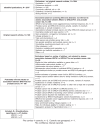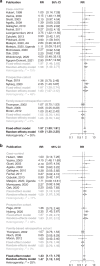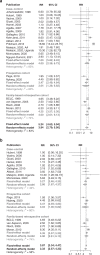BRCA1 and BRCA2 pathogenic variants and prostate cancer risk: systematic review and meta-analysis
- PMID: 34963702
- PMCID: PMC8979955
- DOI: 10.1038/s41416-021-01675-5
BRCA1 and BRCA2 pathogenic variants and prostate cancer risk: systematic review and meta-analysis
Abstract
Background: BRCA1 and BRCA2 pathogenic variants (PVs) are associated with prostate cancer (PCa) risk, but a wide range of relative risks (RRs) has been reported.
Methods: We systematically searched PubMed, Embase, MEDLINE and Cochrane Library in June 2021 for studies that estimated PCa RRs for male BRCA1/2 carriers, with no time or language restrictions. The literature search identified 27 studies (BRCA1: n = 20, BRCA2: n = 21).
Results: The heterogeneity between the published estimates was high (BRCA1: I2 = 30%, BRCA2: I2 = 83%); this could partly be explained by selection for age, family history or aggressive disease, and study-level differences in ethnicity composition, use of historical controls, and location of PVs within BRCA2. The pooled RRs were 2.08 (95% CI 1.38-3.12) for Ashkenazi Jewish BRCA2 carriers, 4.35 (95% CI 3.50-5.41) for non-Ashkenazi European ancestry BRCA2 carriers, and 1.18 (95% CI 0.95-1.47) for BRCA1 carriers. At ages <65 years, the RRs were 7.14 (95% CI 5.33-9.56) for non-Ashkenazi European ancestry BRCA2 and 1.78 (95% CI 1.09-2.91) for BRCA1 carriers.
Conclusions: These PCa risk estimates will assist in guiding clinical management. The study-level subgroup analyses indicate that risks may be modified by age and ethnicity, and for BRCA2 carriers by PV location within the gene, which may guide future risk-estimation studies.
© 2021. The Author(s).
Conflict of interest statement
The authors declare no competing interests.
Figures



References
-
- Johannesdottir G, Gudmundsson J, Bergthorsson JT, Arason A, Agnarsson BA, Eiriksdottir G, et al. High prevalence of the 999del5 mutation in Icelandic breast and ovarian cancer patients. Cancer Res. 1996;56:3663–5. - PubMed
-
- Breast Cancer Linkage Consortium. Cancer risks in BRCA2 mutation carriers. J Natl Cancer Inst. 1999;91:1310–6. - PubMed
-
- Thompson D, Easton DF, Breast Cancer Linkage Consortium Cancer incidence in BRCA1 mutation carriers. J Natl Cancer Inst. 2002;94:1358–65. - PubMed
Publication types
MeSH terms
Substances
Grants and funding
LinkOut - more resources
Full Text Sources
Medical
Research Materials
Miscellaneous

